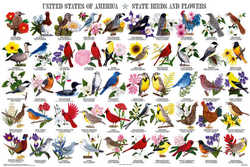Nebraska State Bird
Western Meadowlark

(Sturnella neglecta)
Adopted on March 22, 1929.
The western meadowlark, (Sturnella neglecta,) was adopted by the Forty-fifth Session of the Nebraska Legislature as the official state bird of Nebraska by Joint and Concurrent Resolution on March 22, 1929.
At a Nebraska Federation of Women's Clubs (NFWC) convention at Kearney on Oct. 25, 1928, the following resolution was proposed:Whereas, the Conservation division of NFWC endorses the suggesstion of the General Federation chairman of the division of Wild Life to choose for Nebraska a state bird, therefore be it resolved, that a bird typical of the prairies and abundant in all parts of the state be chosen by this convention assembled and the result combined with the vote of the school children of the state and interested societies to be presented to the next session of the State Legislature for legal acceptance.
Once the resolution was adopted, a list of birds was submitted. The five birds receiving the highest votes were the western meadowlark, robin, bobwhite, brown thrasher and house wren.
At the request of the N.F.W.C., Rep. F. C. Rundle of Hamilton County introduced a joint and concurrent resolution declaring the western meadowlark the state bird. Then-governor Adam McMullen signed the bill on March 22, 1929.
Source: Nebraska Bluebook, 1994-95, pg. 24.
The buoyant, flutelike melody of the Western Meadowlark ringing out across a field can brighten anyone's day, evident in the fact that it is also the state bird of Kansas, Montana, Nebraska, North Dakota, and Oregon
Nebraska State Bird: Western Meadowlark

This bird is known for its loud, cheerful chirps. It is about as big as a robin with a bright yellow chest and throat under a black collar. It builds its nest on the ground and lays between three and seven white eggs with purple and brown spots. The eggs only take two weeks to hatch. It can be found in spring and summer along most dirt roads, sitting on fence posts singing to other meadowlarks nearby.
The western meadowlark is about nine inches long. It has a brown and black back and wings and a bright yellow chest with a black V on it. The meadowlark's colors may be a little duller in winter. It has a long pointed bill. The western meadowlark is very similar to the eastern meadowlark. The western meadowlark's yellow color extends a little further onto its cheek. The songs of the two meadowlarks are the easiest way to tell them apart. The song of the western meadowlark is a series of flute-like gurgling notes that go down the scale. The eastern meadowlark's call is a simpler series of whistles.
Characteristics of the Western Meadowlark
- Length: 8.5 inches
- Sharply-pointed bill
- Buff and brown head stripes
- Yellow underparts with black "v" on breast
- White flanks with black streaks
- Brown upperparts with black streaks
- Brown tail with white outer tail feathers
- Juvenile and winter plumages somewhat duller
- Frequents open habitats
There are few song birds on the Great Plains whose melodic call can evocate such delight and joy as the Western Meadowlark. Undoubtedly that's why it was selected as the State Bird.
The western meadowlark is abundant throughout the state and is noted for its joyous song. The birds are eight to 11 inches long and are brown and streaked above, with bright yellow underparts interrupted by a bold crescent of black across the upper breast, and white outer tail feathers. The birds nest on the ground in grassy fields or meadows and feed largely on insects.
Resolution Joint and Concurrent Resolution
The western meadowlark (Sturnella neglecta) was adopted by the Forty-fifth Session of the Nebraska Legislature as the official state bird of Nebraska by Joint and Concurrent Resolution on March 22, 1929. It read, in part: It read, in part:
"WHEREAS, the Nebraska Federation of Women's Clubs had its convention at Kearney, passed almost unanimously a resolution in
favor of the adoption of a state bird, and
WHEREAS, the Conservation Division of said Federation followed up the action taken by the resolution aforesaid by submitting a list of the five (5)
birds receiving the highest vote, to the schools of the State of Nebraska, with a request that the pupils of such schools express their privilege of
indicating their particular favorite bird, and
WHEREAS, the Ornithologists Union of Nebraska in the spring of 1928, went on record as choosing the Western Meadowlark as a state bird, and
WHEREAS, the Western Meadowlark was also the choice of the Convention of the Nebraska Federation of Women's Clubs, each organization a unit, and
WHEREAS, an intensive study of birds in Nebraska ought to be encouraged, and recognized by this Legislature for the reason that it will stimulate the
interest of present and prospective citizens of the State in Nebraska in the natural life of this state,
NOW, THEREFORE:
BE IT RESOLVED BY THE HOUSE OF REPRESENTATIVES OF THE STATE OF NEBRASKA, THE SENTATE CONCURRING:
Section 1. That the 'Western Meadowlark,' be and hereby is declared the state bird of Nebraska."
Nebraska Statutes
The law designating the western meadow lark as the official Nebraska state bird is SECTION 90-107 of the Nebraska Statutes, Chapter 90 (Special Acts) Section 90-107.
CHAPTER 90 - Special Acts.
SECTION 90-107.
State bird;
western meadowlark. The western meadowlark is hereby declared the state bird of Nebraska.
Source:
Laws 1929, c. 139, § 1, p. 495; C.S.1929, § 84-725; R.S.1943, § 84-717.
Taxonomic Hierarchy: Western Meadow Lark
Kingdom: Animalia - animals
Phylum: Chordata - chordates
Subphylum: Vertebrata - vertebrates
Class: Aves - birds
Order: Passeriformes - perching birds
Family: Fringillidae - buntings, finches, grosbeaks, old world finches, sparrows
Genus: Sturnella Vieillot, 1816 - meadowlarks
Species: Sturnella neglecta Audubon, 1844 - Pradero occidental, western meadowlark








